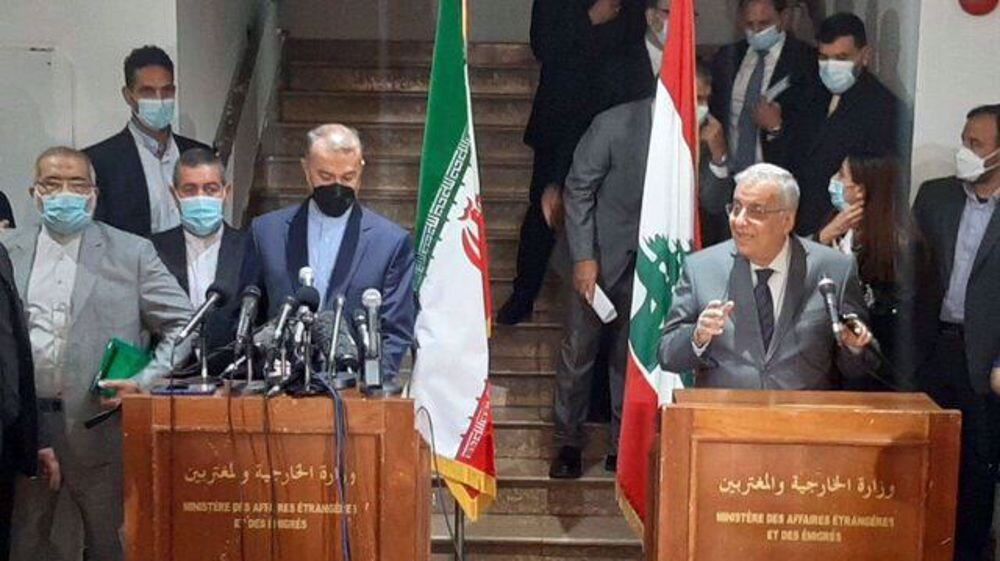Iran FM: US oral messages, E3 unfulfilled promises not criterion to revive JCPOA

TEHRAN - Neither oral message of the United States nor the European trio’s empty promises are taken seriously in Tehran when it comes to their calls for a mutual return to the historic 2015 nuclear agreement, Iran’s foreign minister said on Thursday.
“If there is real intention on the part of the other sides and all of them return to their commitments, Iran will return to its commitments as well,” Hossein Amir-Abdollahian said after a meeting with his Lebanese counterpart Abdallah Bou Habib in Beirut on Thursday.
“However, in this regard, the U.S. oral messages are not our criterion,” Press TV quoted Amir-Abdollahian as telling reporters.
Amir-Abdollahian added, “The unfulfilled promises of the three European countries are not our criterion. We will act in accordance with the other sides’ practical actions, the lifting of the sanctions and their return to their commitments.”
The fate of the nuclear deal, officially called the Joint Comprehensive Plan of Action (JCPOA), was put in limbo after former U.S. President Donald Trump withdrew Washington from it in May 2018 and reinstated harsh economic sanctions against Iran within his “maximum pressure” campaign against Iran.
Following Washington's departure from the agreement, the remaining parties to the JCPOA have launched negotiations in the Austrian capital, Vienna, to revive the deal and bring the U.S. back into full compliance with all of its contractual commitments.
However, the talks have been paused after the election of Ebrahim Raeisi as Iran’s president, with the new administration declaring that Tehran will engage in talks that are only aimed at reaching tangible outcomes, particularly the lifting of all U.S. sanctions.
In the meantime, the European trio — France, Britain and Germany — have joined the U.S. calls on Iran to resume the negotiations as soon as possible.
But Amir-Abdollahian maintained Iran accepts negotiations as a principle, only if it secures the Iranian nation’s rights and interests.
Based on the JCPOA, Iran agreed to put limits on its nuclear program in exchange for termination of economic and financial sanctions. Iran remained fully loyal to the agreement, endorsed by United Nations Security Council Resolution 2231, for a full after the U.S. abrogated the deal. However, in May 219 Iran announced that its “strategic patience” is over and started to gradually remove bans on its nuclear activities. In each compensatory measure that took place at bimonthly interval, Iran was insisting that if the European parties to the deal compensate Iran for the U.S. sanctions, it will reverse its decision. However, Europeans did nothing tangible. They only paid lip service to the need to preserve the multilateral agreement. Iran’s compensatory measures were based on the paragraph 36 of the JCPA which has provided “a mechanism to resolve disputes and allows one side, under certain circumstances, to stop complying with the deal if the other side is out of compliance.”
Amir-Abdollahian said, “In the nuclear agreement, Iran is the only country that remained committed until the very end and we will revive this approach if there is reciprocation from the other sides."
Earlier, the top Iranian diplomat had urged Washington to release at least 10 billion dollars of Iran’s blocked funds as a positive signal that would translate into tangible outcomes for the Iranian people, instead of constantly messaging Iran to come back into the Vienna talks.
“The Americans have been constantly looking for connections and sending messages [to Iran],” he said, adding, “If the Americans have the stated intention, they should release some of Iran’s blocked funds.”
U.S. Secretary of State Antony Blinken said Wednesday that he had spoken with his Russian counterpart about restoring the Iran nuclear deal and claimed that the issue is of mutual concern to the United States and Russia.
"We had an opportunity to compare notes on where we stand and where we hope to go," Blinken said at a Paris news conference.
After the discussion, Russian Foreign Minister Sergey Lavrov said that talks to restore the deal "should be resumed as soon as possible." The global community wants the U.S. to “return to the obligations of the nuclear deal” and halt "illegal restrictions on Iran and all of its trading partners," he said.
After meeting with Lavrov in Moscow, Iranian Foreign Minister Hossein Amir-Abdollahian said Wednesday, "We are now finalizing consultations on this matter and will soon restore our negotiations in Vienna."
